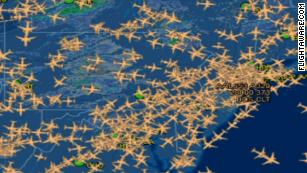The absence of those few workers -- six in northern Virginia and four in Florida, numbers not previously reported --
temporarily shut down travel at New York's La Guardia airport and caused delays at other major hubs, including in New Jersey, Philadelphia and Atlanta.
In many workplaces, 10 people calling out sick would not dramatically interrupt a work day. But these controllers are highly trained for a specific function and cannot be easily replaced.
For aviation experts, the impact that those controllers calling out sick had in a few hours was not surprising.
"Ten people causing significant air travel problems sounds perfectly reasonable, particularly when you consider the towers they work in handling travel in some of the busiest airspace," CNN aviation analyst and former managing director of the National Transportation Safety Board Peter Goelz told CNN.
The FAA was forced to slow down air traffic in some of the nation's busiest airspace and issue a ground stop at New York City's LaGuardia airport due to "a slight increase in sick leave at two air traffic control facilities affecting New York and Florida," the agency said at the time. The FAA declined to confirm the exact number of absences when contacted this week by CNN.
Six air traffic controllers in the Washington air traffic control facility in Leesburg, Virginia and four air traffic controllers in the Jacksonville, Florida facility called out sick that Friday morning, the day of the second full missed paycheck for federal workers and contractors.
"We had some controllers call out sick at the Washington Center, that's our big en-route center, and also in Jacksonville, and they work a lot of airspace on the Northeast corridor," Paul Rinaldi, president of the National Air Traffic Controllers Association, told CNN.
Both the Jacksonville and Washington air traffic control facilities manage two busy areas of air traffic in the country up and down the East Coast. Air traffic controllers make sure that airplanes remain a safe distance from each other in the air and land and take off safely. They also monitor planes while they are taxiing and on the ground at airports.
Because aviation is so interconnected, a problem in one of the busiest parts of the country can cause a widespread ripple effect -- and it did. After the FAA fixed its staffing issues on January 25, residual delays continued throughout the day.
"The system is surprisingly sensitive to any kind of disruption, and, once the disruption starts, it can cascade through the system causing a larger impact than one might imagine," Goelz said.
Beyond the highly-specialized nature of the job, air traffic controllers are at a 30-year staffing low, so there isn't a group of controllers who can easily fill in when people call out sick. Air-traffic controllers are also not allowed to work more than 10 hours a day, six days a week, according to Rinaldi.
"The air traffic control system is already stretched to its limits because of an aging controller workforce not being replaced in numbers that allows us to keep the system expanding," Goelz said. "So, if you add to that inadequate staffing on a shift, you're going to see a substantial ripple effect."
A few hours later, as the flight delays continued to stack up, Trump announced that he would re-open the government until February 15 -- even though Democrats and Republicans in Congress had not come to a compromise on funding for the border wall Trump had demanded.
While 10 air traffic controllers calling out led to
a breaking point for the White House, TSA staffing shortages at some of the nation's largest airports were also a contributing factor.
Before that Friday morning, the White House had been meeting and communicating with transportation agencies, including the Department of Transportation, to discuss the impact of the shutdown on commercial aviation, information that contributed to the deal that temporarily ended the government shutdown, according to a source familiar with the discussions.
The White House was given a stark portrayal for what would happen as it relates to commercial aviation if this shutdown continued, the source said. Then, the White House saw it
play out in real time with air traffic control staffing issues causing massive delays in several northeastern airports.
Trump's aides, along with his outside political advisers and his allies on Capitol Hill, had worried major flight issues would amplify the blame Trump was already facing for the shutdown. They, too, believed that major disruptions to air travel would ramp up pressure to reopen the government without wall funding.
No one has alleged that the air traffic controller call outs on Jan. 25 were coordinated, and NATCA does not support any coordinated activity that would disrupt national airspace.
Rinaldi said the union does not "condone or endorse any federal employees participating in or endorsing a coordinated activity that negatively affects the capacity of the National Airspace System or other activities that undermine the professional image and reputation of the men and women we represent."
But Rinaldi said the costs were too high.
"Many controllers have reached the breaking point of exhaustion, stress and worry caused by this shutdown," Rinaldi said.
With another potential government shutdown less than two weeks away, Rinaldi is concerned about his workforce.
"They feel undervalued, demoralized, and I'm using the word traumatized, they are traumatized," Rinaldi said. "They went through a traumatic event, and we don't ever need to do that again to our national airspace system."





















No comments:
Post a Comment